Christopher Patterson's Blog, page 6
March 4, 2016
What Makes Me Want to Keep Reading by Brett Lindskog
Another thing that turns me off of books is not getting to the point. The Wheel of Time is a great example of this. It started off great, neat world, real characters, high fantasy stuff. Then it kept going and going and going, with nothing being accomplished and whatever the characters did accomplish would seem to be set back with convenient resurrections and new prophecies. This was never going to end. I want my time back.
The above things that pull me into and push me away from a book are hard to quantify just by the dust jacket. I usually only go for books recommended to me by the serious readers that I know in my life. I usually can't stand the copy that is put onto the dust jacket. This is why there are things like GoodReads, and Reddit, and the good ole' fashioned book club.
Brett Lindskog is a good friend of Christopher Patterson and an avid fantasy and science fiction reader as well as a reader of Christian motivational non-fiction.
http://www.christopher-patterson.com/...
A Chance Beginning
December 18, 2015
The World of Self-Publishing
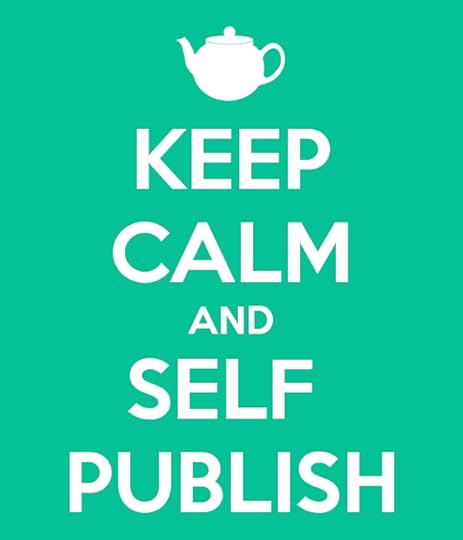
I am by no means an expert in self-publishing. I have one book out on Amazon, published through CreateSpace and Amazon Kindle, and my goal is to have Dark Winds: Book Two of the Shadow’s Fire Trilogy and Breaking the Flame: Book Three of the Shadow’s Fire Trilogy out by next spring, but who knows. My experience with self-publishing, I suppose, has been somewhat of a double-edged sword, a rollercoaster, like riding a wave, and any other metaphor for an up and down experience you could think of. Would I suggest self-publishing to other people? Sure, for the right person. I don’t think it is for everyone. If you had asked me that question a year ago, after A Chance Beginning had been out for a little while and my sales looked decent, I would have said, “It’s for everyone. Absolutely. Down with the traditional publisher.” I find that this process is much like selling life insurance. When I first started selling life insurance, my world was all about Universal Life Insurance. That was the only life insurance that was good life insurance. If you didn’t buy UL, you were stupid. Then, after a while and some much needed world experience, I realized that different types of insurance work for different people in different places in their lives. I think looking at the writing and publishing industry, my attitude is much the same. I recently had an opportunity to sit down with a man named Grael Norton from Wheatmark, a publishing company locally based in Tucson that helps authors do a number of different things, including preparing their manuscripts for self-publishing, helping people publish through Wheatmark, and helping writers prepare their manuscripts for trade publishers. Through my experiences, I had already started to realize how the writing and publishing industry worked, but sitting down with Grael really helped…well, open my eyes for a lack of better terms.
What I like about self-publishing: You’re in the driver seat. Your baby stays your baby. You get to write what you want to write. Your cover looks the way you want it to look. For the most part, you establish the price of your book. You help design the interior. Its all you. For the control freak like me, the micromanager, this is perfect. Self-publishing has been a great experience. I was, at one point, actually contracted with a publishing company. I will omit their name in honor of professionalism, but I started to realize that I didn’t have full control over my own work. In fact, in some cases, I had very little control. In fact, in some cases, I had no control. This was my imagination. This was my hard work, my sweat equity so to speak, and I can’t say what I want to say, can’t have this character and can’t use this language? Wait…what? I need to cut the first three chapters out? This character isn’t driving the plot. Get rid of him? It’s kind of crazy, when you think about it. All this hard work and, boom, your story is no longer your story. Don’t get me wrong, I am extremely grateful for the experience. But I am also grateful for the opportunity to self-publish.
Perhaps part of my positive experience with self publishing was the fact that I had received some great editing, and continued to receive great editing after I had left the publishing company I was contracted with. I have great friends that were willing to read my book before I published it. And I have thick skin. I can take criticism very well and understand that a different set of eyes will see different things. I also have friends that are fantastic artists and photographers and were willing to create internal design for me and cover design. These things all made self publishing a lot of fun and very easy. And, maybe one of the greatest experiences with self-publishing is that when I gave CreateSpace the okay, I got to physically see my book two weeks later rather than 18 months later.

What I don’t like: So, some of the things that I liked about self-publishing are also some of the things I don’t like. I now realize that my cover needs some revamping, as does my interior design. Not that they are terrible, but in terms of what is eye-catching, what sells in the fantasy/science fiction industry, I had no one to direct me. If I did, as I have found out on my own in speaking with people such as Grael Norton, I would have learned that there are certain aspects of the cover and interior that I missed, which should be there. I think that is probably one advantage in not self-publishing, there is someone there the whole time advising you, or just doing it for you. Editing too. I said I had great editing even though I decided to self-publish. However, I have already revised my already published book twice and am in the process of doing it a third time. I mean, I didn’t have someone sitting down and only working on my manuscript. They were awesome, but they had to edit my book when they had time. And they did it for next to free. The result—me revising an already published book three times.
Lastly, what I really don’t like about self-publishing is the marketing and publicity. I have become self employed, which means all the marketing and publicity is on me, including the cost. I’m not a publicist. I don’t have a specialty in marketing. This has been very difficult for me. I’ve done Facebook and twitter, and that has been mildly successful. I’ve done local book fairs and book signings. I sell a few books there. But all in all, it’s been pretty hard getting my book in front of eyes, in front of readers. Do I think my book is good enough to sell itself through word of mouth? Yes, I do. But how do I get those initial people to read my book? And how do I continually hound friends and family about telling their other friends and family about my book? I’m sure they would understand, but part of me just feels like a pest.
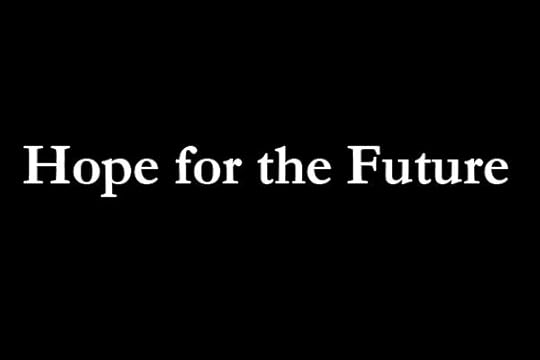
I think self-publishing and companies like Amazon and CreateSpace and Kindle have revolutionized the industry and created a way for more writers to be heard, get their work out there, see their ideas on a page, and live a dream. But it is certainly a different, if not difficult, road. There are some great written works that may have never seen the light of day if it weren’t for self-publishing, and then there are some works that should have never seen the light of day. I am personally glad for my journey, glad for self-publishing, and very hopeful and expectant for the future and what it holds for my writing career. Writing and my journey has put me in front of some amazing people, people that I truly believe will help me achieve my goal of being a best selling author. If you have had a chance, make sure you check out my first novel, A Chance Beginning. You can buy it through Amazon.com for only $13.95 in paperback or for $2.99 on kindle.
December 16, 2015
The Five Things I Wish Fantasy Authors Would Stop Doing

So, being a fantasy author, and growing up reading, writing, watching, imagining, and drawing fantasy related stuff, I have found that the fantasy genre, like many other genres, have some fairly significant clichés and archetypal story lines and characters. I truly think that some of these are unavoidable. Fantasy is fantasy just like mystery is mystery and romance is romance. There is only so many different story lines, ideas, etc. that an author can come up with.

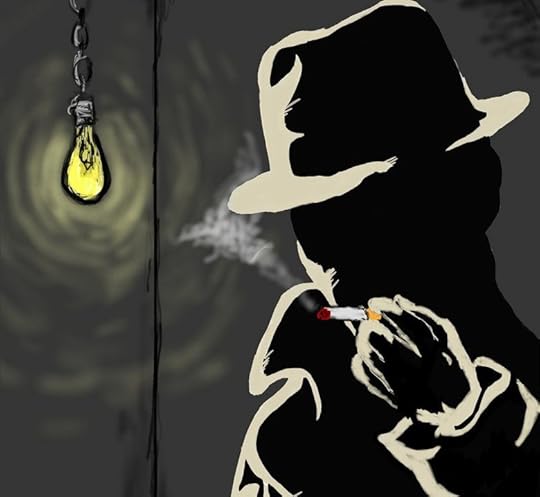
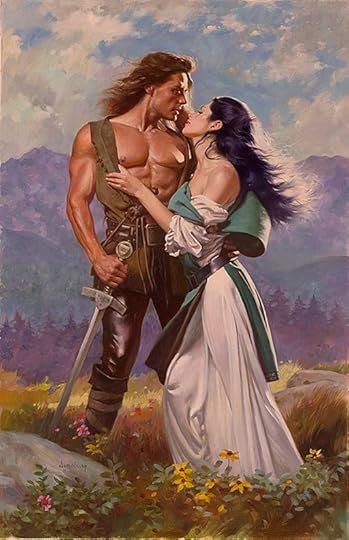
However, there just seems to be a number of things fantasy authors - and this is probably true with mystery, romance, and political intrigue authors as well - continually do that places us in the realm of popcorn fiction, turns off readers, makes us seem like the nerds playing magic in the high school hallways (no offense to nerds or Magic the Gathering players) and irritates even me. So, here is my list of the five things I wish fantasy authors would stop doing.
1. Deus Ex Machina
What does this mean? It literally means god from the machine. This is the literary device that was commonly used by Greek and Roman playwrights to work the gods into their plays or to help their heroes solve seemingly unsolvable situations. So how is this applicable today? Don't get mad at me. I love Tolkien and I love Lord of the Rings, but one of the final scenes, when the Giant Eagles save Frodo and Sam from the impending doom of Mount Doom's wrath, that is a perfect example of Deus Ex Machina. They should've died. You know it. I know it. The whole world knows it. The fact is, Tolkien broke a lot of the literary rules that many authors today must live by - and he is still great. But as I continue to read fantasy novels, and as I continue to write fantasy novels, I begin to realize that many fantasy novels extract their heroes and save their protagonists from situations that are hopeless, all because of a spell the wizard forgot he had, or the magic sword the knight didn't realize he possessed, or the world bending acorn the ranger received as an elvish gift. I suppose the whole point to fantasy and science fiction is that these are tales that are beyond reality, and I am certainly not looking for extensive realism in my fantasy, but I do want some. As morbid as it sounds, I want main characters to die. I want them to face the same hardships I face, encounter the same trials and tribulations, work themselves out of bad situations the same way I would - only, with the help of magic or a dragon or a magic sword. But I don't want them to be miraculously saved. When Matrim Cauthon in the Wheel of Time series (spoiler alert) dies, I wanted him to stay dead. But Rand al'Thor, not realizing he had the power of Bane Fire, brings Matrim back. Again, I know some of this is going to occur in fantasy, and I know it occurs in my own writing, I just want less of it. I believe, with less Deus Ex Machina, fantasy would cross genre boundaries.
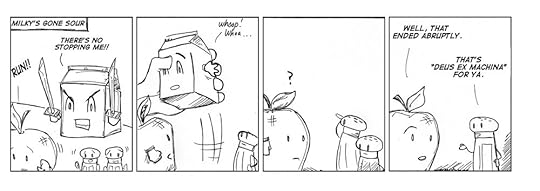
2. Names and Places that I either can't pronounce, or sound like the author was literally looking around his/her desk and putting random words together
Everyone who reads fantasy and science fiction knows what I mean. You come to that one name (and for the sake of not wanting to slam any particular author, I will leave specific examples out) and as you sound it out loud - "Pap-stap-uter-ex" - you realize that at that moment, at the moment the author needed that profound name, he happened to be sitting in front of his computer with a paperclip in his hand and a box of staples on his desk, and he thought by adding ex to the end of the name, it made it clever. So as Sir Papstaputerex goes through his adventures, all you can think about is, "You couldn't come up with anything better?" I know that these are make believe world, and I know that these are make believe people, but can't we be a little more creative? And how about names and places that I can pronounce? I read a book not too long ago, and the name of a people in the book was literally so long, it took up a whole line on a page, and the author even explained how other peoples shortened the name because it was so long. WHAT? It just seems to me that there is going to be a certain amount of popcorn involved in fantasy, which is ok and expected. But that popcorn level goes up as we have more and more inaudible, unpronounceable, wacky names and places.
3. Telling Not Showing
Early on in my writing "career," I got slammed on this concept a lot. I mean, a lot. So much so, that I really reconsidered whether or not I wanted to be an author. I mean, here I am, having these amazing, insanely awesome scenes in my head. How else am I suppose to explain these scenes or places or even people to my audience other than describing them it such great detail that it takes a total of three to four pages to just explain the way the sun rises over the mountains, or the way her hair flutters in the wind? Two amazing authors are so famously guilty of doing this that if they were fledgling writers today, they may have never made it. Of course, I am talking about Tolkien and Jordan. I love their work and view them as pioneers in Fantasy Fiction. However, it seems that too many modern fantasy authors have chosen to follow in these revolutionaries' exact footsteps. Times change, as do the requirements and expectations of industries, including writing. I want to experience people, scenes, and places through dialogue (which will be another pet peeve of mine) and action, fighting, smelling, seeing. I really feel like I am just being told a story when I pick up many fantasy novels. I want to smell the smells, hear the sounds, see the sights.
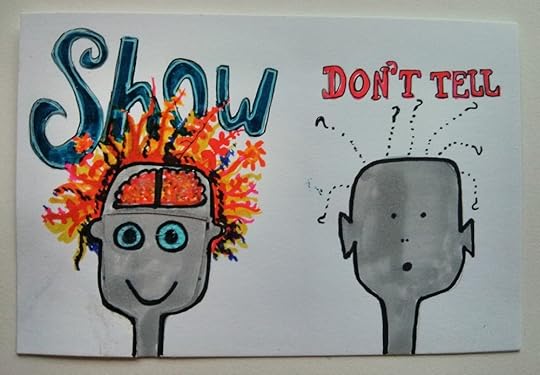
4. Bad Dialogue
What is it about Fantasy and Science Fiction that authors think its a license for superfluous language, hyperbolic speech, and just bad dialogue in general? I mean, really? I often wonder if authors think to themselves, "Would I really speak this way?" Again, the author typically isn't inputting themselves into the story. These are other-worldly people, in other-worldly places, dealing with other-worldly things. But, if I want people like me reading my books, I might want my characters to speak like me - or them. Here is just a quick example of what I am talking about. Mind you, I just came up with this.
"Ho there, comrade of the eastern hills where the sun shines warm and bright every day of this and every year," Ethgar Blue Beard of the Hakawakaluka Clan exclaimed with great admiration and mirth, his bluish-black beard floundering in the subtle, cool, crisp breeze of the Fourth Wind and his black eyes blazing like dark, endless coals burning on a freezing, moonless, starless night. (A homage to my previous two pet peeves).
"Ho there, fellow barbarian, master of the western steps, where the grass grows tall and strong, lord of the horse people and crusher of all who refuse to follow the great traditions of your people," Spik'a-Val'um'inius replied, his hair - as bright as the noonday sun - shining and casting out the ever growing shadows of a darkening world, his eyes meeting the dark intensity of Ethgar's with an icy coolness about them, one that might freeze those he looked upon if it were not for the warmth in his heart.
"Dost thou come with the good news that makes my heart race like the wild horses of my lands?" Ethgar asked, his well-muscled neck undulating with every word, presenting his arms wide open, in friendship as a long lost brother might meet his kin.
"Nay, nay," Spik'a-Val'um'inius replied. "My news is as dark as witch's brew in the dead of winter."
What the hell was just said? I wrote it and I don't even know what I just wrote. But this seems to be the norm for most fantasy novels. Why? That's a great question. I feel like most fantasy novelists think they have to be the next Shakespeare. But I don't think that is what people are looking for. I think they're looking for stories they can relate to and dialogue they can understand. We, as authors, need to think about how we speak and how we would respond to certain situations and realize that that would be the response of most people, and that's what they can relate to - and that is what they want to read.
5. What is the Motivation?
Lastly, I need motivation. What is motivating the main character to follow the kooky wizard that just barged into the pub talking about the end of the world and so-and-so being the savior, and they have to leave right now? I truly believe that a thousand years ago, or in some make believe land, or a thousand years from now, people would respond the same way people would respond today.
"Um, here, let me buy you a beer and I'll meet you out back in five minutes," while he takes off as fast as he can.
Or
"Get the hell outta here before I beat you and have you thrown in jail."
If everyone is happy and content, why would they change? Or, if everything is so hopeless, there is never a thought a breaking the chains of oppression, why would they change? I suppose this speaks to the epic nature of most fantasy, the overarching ideas and themes, but no matter how epic a fantasy novel is, it needs to have some real motivation. There needs to be conflict. There needs to be problems. Something needs to be amiss and something needs to convince the protagonist he or she needs to change, needs to go an adventure, needs to go with the crazy wizard.
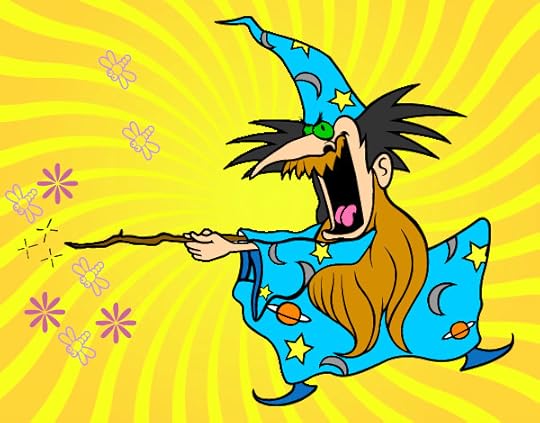
I do believe that at some point, and possibly still, I am at fault for committing all of these writing sins. But as I try to move from being pigeon-holed to one genre to writing across genres, as most authors want, I try as hard as humanly possible to avoid these mistakes. Let me know what your pet peeves and frustrations are with novels and authors. Thanks and Happy Reading!
December 14, 2015
What Makes Me Want to Keep Reading by Brett Lindskog
As my tastes in literature have changed I've noticed that I go less and less for cool looking covers and cheesy fantasy novels to more and more realistic fantasy novels. Not realistic as in the fantasy being gone, but realistic as in feeling like the characters could be real people. What really makes me disgusted reading a novel, any novel, is the author playing God with the characters. Machina Ex Deus is lazy writing and a sign that the author is not serious about the humanness of the characters. And if we aren't reading novels to explore humanness at some level, what is the point? The characters are what drives Game of Thrones for example. These feel like real people put into real situations acting in a real way.
Another thing that turns me off of books is not getting to the point. The Wheel of Time is a great example of this. It started off great, neat world, real characters, high fantasy stuff. Then it kept going and going and going, with nothing being accomplished and whatever the characters did accomplish would seem to be set back with convenient resurrections and new prophecies. This was never going to end. I want my time back.
The above things that pull me into and push me away from a book are hard to quantify just by the dust jacket. I usually only go for books recommended to me by the serious readers that I know in my life. I usually can't stand the copy that is put onto the dust jacket. This is why there are things like GoodReads, and Reddit, and the good ole' fashioned book club.
Brett Lindskog is a good friend of Christopher Patterson and an avid fantasy and science fiction reader as well as a reader of Christian motivational non-fiction.
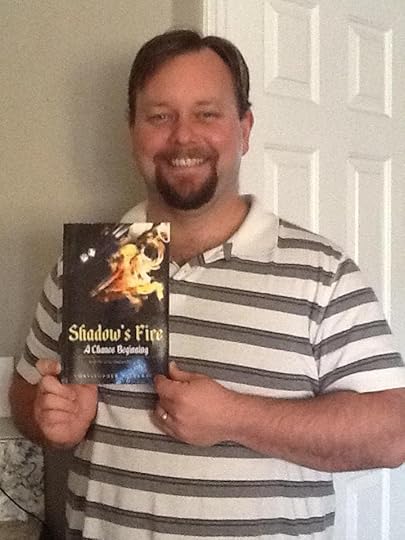
December 11, 2015
The Call of Duty: Book One of the Holy Flame Trilogy
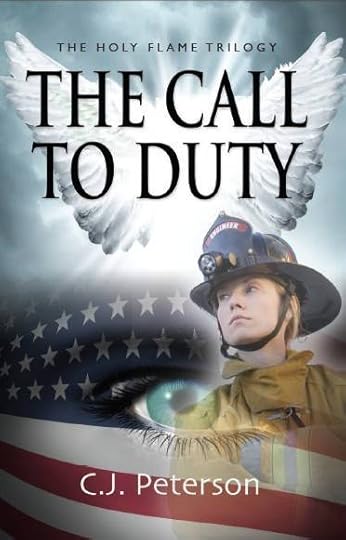
I recently met, through a writer's network, another author named CJ Peterson. CJ is a youth pastor and passionate not only about her work in youth ministries and about Christ, but also passionate about writing and sharing her faith experience through the written word. We agreed to review swap and, even though it probably took me much longer than it should have, I completed the first book in her three book series about a female firefighter, Casey, who struggles with, questions, discovers, and then shares her faith. Here is my review of The Call of Duty.
The story of Casey in The Call of Duty is one that is refreshing and heart felt. Peterson does an excellent job of relating the faith journey of a firefighter who does not believe in God to her moment of somewhat clarity and understanding that God has a purpose for her. As I read The Call of Duty, I felt like I could be reading the biography of someone who is working in public service and coming to know Christ. it didn't feel over the top, and it didn't feel muddled down with clichés and the feel-good allegories I often get tired of when reading Christian fiction.
One must understand that this is a Christian-fiction novel. After reading some of the reviews posted for The Call of Duty on amazon.com, most of the negative comments were related to the fact that there are too many references to Christianity and faith in this novel. That seems a little ridiculous to me since this is meant to be a Christian novel. The outward expression of faith and talking about God and Christ is intentional. I think that is something people should understand before engaging this novel. This is a Christian novel. Its a great novel. Its a great tale of one's Christian growth and faith. And its a great Christian novel.
I had only a couple criticisms of The Call of Duty. Firstly, it could have used a little more editing. It was just tiny issues, small grammatical things. I don't think it is enough to detract someone from reading the novel and it certainly did not take away from the story and its content. The other critique I had, and I only picked up on this because I have been criticized extensively about this in my own writing, is that there were times I had a little difficulty determining whose point of view the story was being told from.
I think these are minor issues with an otherwise very well scripted story that has an extremely positive message in a world with ever increasing negative images, stories, thoughts, ideas, and media coverage. I would recommend this book to anyone looking for a story of faith and journey and a person's experience in coming to know Christ.
February 17, 2015
On Writing Christian Fantasy by Dona Watson
That’s because the realm of the imagination is a wonderful place. I think of it as brain candy. Orcs, unicorns, elves, angels, magic, trolls…each one of these are the work of someone’s amazing imagination.
As is well known, much of our current day fantasy fiction springs from the hotbed of Tolkien’s mind. But the roots of his creations hark back even further to the days of Norse imagination and mythology. However, Tolkien showed his mastery by taking an existing idea and making it better, developing it into something amazing that people could wrap their minds around.
And that is what fantasy writers do. We take a wonderful idea, add our own angle, and create something new.
However, much like Tolkien initially experienced, we often find that our intended audience rebels against our creations, considering our stories too bizarre. In many ways, the world of Christian fiction has become a narrow marketplace. While some who read Christian fiction choose not to venture beyond the popular and into the wide world of fantasy, others of us yearn to do so, daring to consider the fantastical and the supernatural and ask, “What if?”.
When Tolkien created Middle-Earth, he took the creations of the Norse mind and molded them into the mindset of a Christian worldview. Angels became known as wizards. Demons became orcs and other dark creatures. (For a brief yet comprehensive explanation of the lineage of Tolkien’s creations that goes beyond this post, see this video: http://youtu.be/YxgsxaFWWHQ.)
It took years for many Christians to accept the creations of Tolkien’s mind and for the most part, his work is now a treasured part of our literary culture, even translated into film, the possibility of which Tolkien himself would never have dreamed.
While we might at times feel alone, Christian fantasy writers tread narrow rocky pathways that, if we look hard enough, have previously been trod by those who became masters at writing stories born in a mind firmly couched in Christian theology.
There are many “radicals” like ourselves who have found the confines of traditional Christian fantasy too restrictive, too narrow a place to express the outflow of our imaginations. Many of our fellow Christians who yearn to explore the realms of the fantastic have been forced to look outside of Christian publishing to satisfy their craving for more. And so we find the Christian fiction world to be in a Catch-22 situation. In traditionally published Christian fantasy fiction markets, there aren’t enough writers because there aren’t enough readers—and there aren’t enough readers because there aren’t enough writers.
However, the world of independent publishing has allowed us to create what I will call a gray market—a world that lies between the general fantasy market and the traditional Christian fiction market.
In addition, indie publishing has allowed Christian fantasy writers a forum in which we can speak our minds freely. As indie writers, we can create and publish books targeted at the general market and yet maintain our Christian worldview. Even more Christian fantasy writers have found a niche in the general market where they can hold their candle high.
As writers we find that our market has become reachable in so many ways. And the good news is that Christian readers are discovering this new outlet for stories they have long craved to read. Not only is it a good time to be a Christian fantasy writer, it is also a good time to be a Christian fantasy reader. And that, my friend, is a very good thing.
So to sum all this up, is it challenging to write fantasy from a Christian worldview? The answer would be an unequivocal “Yes” but mostly because writing fantasy is hard.
Is it difficult for a Christian fantasy writer to reach their readers? If you write fantasy for adults and try to find a traditional Christian publisher, you will find the going extremely hard. If, however, you have enough energy to become a small business owner and publish your own work as an indie writer/publisher, the opportunities are unlimited.
At least that has been my experience. If your story differs from mine, I’d love to hear it. Because, as they say, we’re all in this together.
Dona Watson
Dona Watson grew up with a book in one hand, dreaming about imaginary worlds of mystery and adventure. In high school, she found an old novel in a used bookstore, fell in love with fantasy fiction and never looked back. Look for her award-winning fantasy novel The Lightstone of Perlan, to be published this year, as well as other short stories online and in print. A writer and editor with an unbridled love for reading and writing fiction, Dona lives surrounded by way too many books in Southern California with a wonderful family and a precocious little dog. You can find her online at http://donawatson.com.
http://donawatson.com - facebook.com/dona.watson
twitter.com/DonaWatson - http://google.com/+DonaWatson
January 12, 2015
Starbucks Gift Card Giveaway!!!
In an effort to get a few more (really, a lot more) reviews posted up on Amazon, I am giving away two $25 gift cards to Starbucks. Just in case you can’t quite believe what you just read, it is true. I am giving away two $25 gift cards to Starbucks. So, to qualify, here is what you have to do. Post a review of A Chance Beginning on Amazon at http://www.amazon.com/Chance-Beginnin... and then post that review to my Facebook Author’s page: https://www.facebook.com/TucsonAuthor.... If you have already posted a review to Amazon, I cannot truly thank you enough, so simply copy and paste it to my Facebook page. After doing so, I will drop your name in a hat. To get one extra entry in ”the hat,” take a picture of you holding A Chance Beginning and also post that to my Facebook page. Okay, so what do you have to do?
1. Read my book. I know many of you have already and I thank you.
2. Post a review to Amazon.
3. Copy and Paste that review to my Author Facebook page.
4. For an extra entry, post a picture of you holding my book to my Author Facebook page.
5. Also, if you are a Goodreads member, I would appreciate a review there as well. It can certainly be the same one you posted to Amazon.
So, there you have it, my first official giveaway. I hope and pray that it is successful and would love for you all to participate. I think it will be a lot of fun. And who could pass up the opportunity to win two $25 Starbucks gift cards. I will do the drawing at the end of February and inform the two winners right away. If you are not a resident of Tucson, no worries, I will gladly mail your gift card to you.
November 22, 2014
Salon.com Article Speaks on the Respect Fantasy Deserves
http://www.salon.com/2010/01/06/lotr_...
www.christopher-patterson.com/blog/
A Chance Beginning
Author Lev Grossman Gives Fantasy Some Respect in Wallstreet Journal
http://online.wsj.com/articles/SB1000...
http://www.christopher-patterson.com/...
A Chance Beginning
The Guardian Magazine Gives Fantasy a Little Respect
http://www.theguardian.com/books/book...
www.christopher-patterson.com/blog/
A Chance Beginning



